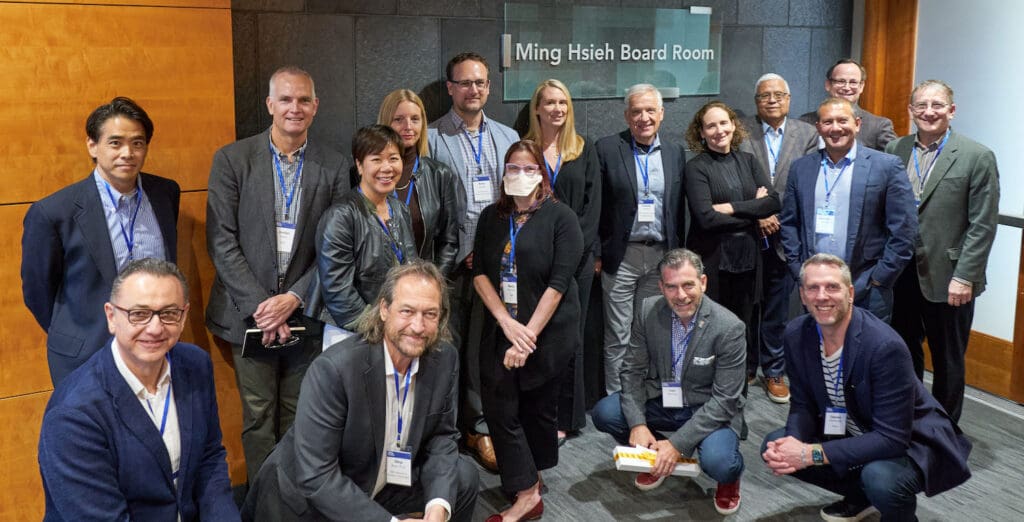The Growing Need for Ethical and Responsible Leaders in the Age of Ever More Powerful Technologies

As part of our ongoing series of leadership roundtable discussions, we recently partnered with Techstars to convene a group of top leaders from industry and academia at Viterbi School of Engineering at USC. The topic was digital transformation of established industries and, after touring various innovation spaces at Viterbi, we featured brief presentations from three top innovation leaders:
- Skip Russo, Director for Medical Virtual Reality at the USC Institute for Creative Technologies who showcased his creative use of VR in helping address mental health challenges;
- Darren MacDonald, Chief Customer Officer of Petco who discussed the evolution of retail including Petco’s integrated business model and targeted personalization; and
- Paolo Pirjanian, Founder/CEO of Embodied who developed Moxie, a social robot designed with technology that allows it to engage with children in a revolutionary way.
After each presenter described significant breakthroughs in how their innovations could address compelling challenges and critical needs, the broader group’s discussion quickly migrated to how these powerful technologies could be abused when implemented in the exclusive pursuit of capitalist motives. This led to a higher level exchange focused on the need for ethical frameworks when bringing break-through innovation to society. I have tried to capture significant observations and key themes from that important conversation below.
- In today’s rapidly advancing world, new technologies are transforming industries, economies, and societies at an unprecedented pace. As the power of these technologies grows, so does the need for ethical and responsible leaders who can harness this power responsibly. Short-term profits and the pursuit of capitalism at all costs must not be the sole measures of success for new technologies. Instead, technology leaders must consider broader societal impacts associated with their innovations.
- In recent years, we have witnessed the rise of addictive technologies, such as social media platforms and mobile applications. Despite the great promise of these technologies to better connect and unify our society, they too often have resulted in increased isolation and division. The relentless pursuit of user engagement and monetization has resulted in addictive behaviors, mental health issues, and the erosion of personal privacy. In the case of Tiktok, we are seeing both growing regulation and some outright bans. It is becoming more urgent that ethical leaders recognize the need for responsible design and usage of such technologies, placing user well-being and societal impact at the forefront.
- While artificial intelligence has the potential to revolutionize industries and automate various functions and decision-making processes, ethical concerns arise when AI algorithms perpetuate biases, invade privacy, or replace human jobs without appropriate safeguards. Responsible leaders must ensure that AI technologies are developed and deployed ethically, transparently, and with accountability to mitigate these risks.
- In a world too often driven by the pursuit of short-term profits, the potential risks and consequences of new technologies can be overlooked. As technology continues to advance, we must resist the temptation to prioritize short term financial gains over the long-term well-being of society. Ethical leaders understand the need to consider the broader implications of their actions and strive to strike a balance between innovation and responsible development of society. One of the USC Dean’s astutely pointed out that while the pace of innovation was accelerating, our ability as humans to understand and effectively adopt innovation has remained more or less constant, resulting in a growing “risk” gap.
- The ethical concerns surrounding nuclear weapons serve as a cautionary tale, highlighting the importance of ethical leadership. The devastating power of these weapons necessitates responsible decision-making to ensure their non-proliferation and peaceful use. Similarly, as technologies like AI become increasingly sophisticated, ethical leaders must take proactive measures to address concerns regarding deep fakes, privacy invasion, and the potential displacement of human functions and decision-making processes. While legislative action might temporarily delay nefarious practices, the broad-base availability of such tools can only be managed through increased awareness of risks and a shared commitment by leaders to their ethical and responsible applications. Educational institutions will play a critical role in developing the next generation of enlightened leaders. According to one of our panelists, there is a pressing need to “create better humans” that can effectively navigate this complex and accelerating environment.
- To cultivate ethical leaders who can navigate the complex challenges posed by advancing technologies, a return to a liberal arts education is crucial. The recent obsession with STEM and “practical learning” has often crowded-out the softer elements that are typically part of a more traditional liberal education. A liberal arts education can help develop a stronger sense of social responsibility as well as transferable intellectual and practical skills, such as communication, analytical, and problem-solving abilities, and a demonstrated ability to apply knowledge and skills in real-world settings. Liberal arts education encourages interdisciplinary learning, critical thinking, and a broader understanding of the world we live in. By studying humanities, social sciences, and ethics, future leaders are better able to develop a well-rounded perspective that enables them to consider the ethical implications of their decisions and the impact on society as a whole.
As new technologies continue to grow in power and influence, the need for ethical and responsible leaders becomes increasingly important. We must move beyond the pursuit of short-term profits and embrace a more holistic approach that values societal well-being. By returning to a liberal arts education, future leaders can develop a broader appreciation of society and enhance their ability to make ethical decisions. Just as the ethical use of nuclear weapons is paramount, the responsible use of addictive technologies and AI requires proactive and ethical leadership. Let us all strive for a future where technology serves humanity’s best interests and ensures a more equitable and sustainable world. Time is short, so we must commit now to developing leaders who more fully appreciate the big picture.